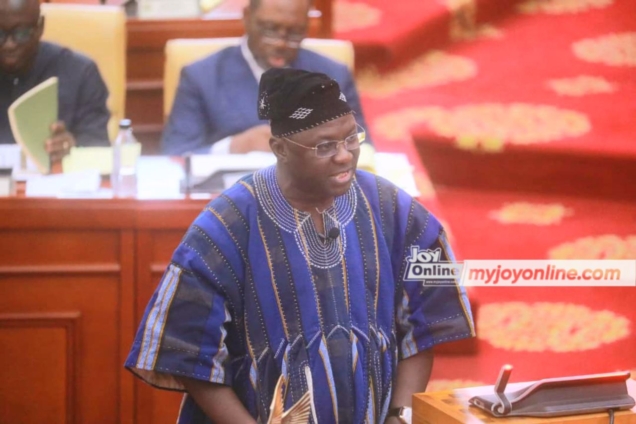Economist Dr. Theo Acheampong acknowledges government's clear commitment in the Mid-year budget review to cut spending, influenced by the International Monetary Fund (IMF) programme.
“Were the IMF not around in any other year, especially with the election around the corner, government would have been spending and this is a positive development," he stated.
Dr Acheampong highlighted the relative stabilisation on the macroeconomic front, noting several indicators pointing to sustained recovery.
However, he stated the need for this recovery to address micro-level issues, such as the cost of living.
Read also: Hoteliers Association express disappointment over Mid-Year Budget Review neglecting core issues
Speaking on Joy News’ PM Express on Tuesday, he pointed out that the Mid-year budget and the forthcoming November budget aim to shift the economy's momentum towards growth.
“There’s talk about roads and potentially bringing back even road tolls, then there’s a big emphasis on housing and a few other things on trying to collect a little bit more revenue," he said.

“But I think overall, the story for me is relatively positive. And compared to other supplementary budgets or mid-year budgets, where the government normally comes to ask for more money, this time around, they’re not asking for more money and spending is within the parameters that had been set.”
Read also: We’re living within our means – Finance Minister
Last month, the IMF's executive board approved the second review of Ghana's $3 billion loan programme, allowing for the immediate disbursement of around $360 million.
This approval followed Ghana's agreement with its official creditor committee, a prerequisite for unlocking the second tranche.
This new tranche increases the total IMF disbursements under the three-year bailout programme, aimed at resolving Ghana's severe economic crisis, to $1.56 billion.
In a statement, the IMF noted that Ghana’s performance under the programme has been generally strong.
"The authorities’ strategy aimed at restoring macroeconomic stability and reducing debt vulnerabilities is paying off, with clear signs of stabilisation emerging," said IMF Deputy Managing Director Kenji Okamu.
Latest Stories
-
Woman dies after being set on fire on NYC subway
45 minutes -
Elon Musk’s curious fixation with Britain
49 minutes -
EBID wins the Africa Sustainability Award
3 hours -
Expansion Drive: Takoradi Technical University increases faculties
7 hours -
SHS heads demand payment of outstanding funds before reopening of schools
8 hours -
We thank God for the 2024 general elections – Akufo-Addo
8 hours -
Coconut Grove Beach Resort marks 30 years of excellence with memorable 9 lessons & carols service
8 hours -
WAFU B U-17 Girls’ Cup: Black Maidens beat Nigeria on penalties to win inaugral tournament
9 hours -
Real Madrid beat Sevilla to keep pressure on leaders Atletico
10 hours -
Liverpool put six past Spurs to go four points clear
10 hours -
Manchester United lose 3-0 at home to Bournemouth yet again
10 hours -
CHAN 2024Q: ‘It’s still an open game’ – Didi on Ghana’s draw with Nigeria
10 hours -
CHAN 2024Q: Ghana’s Black Galaxies held by Nigeria in first-leg tie
11 hours -
Dr Nduom hopeful defunct GN bank will be restored under Mahama administration
12 hours -
Bridget Bonnie celebrates NDC Victory, champions hope for women and youth
12 hours

